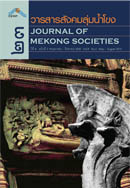Bo Huahead: Indienous Salt-making Ponds and Communities in the Lower Songkhram River Basin, Northeastern Thailand
Main Article Content
Abstract
‘Bo Huahaed’ is the term for indigenous salt-making ponds located in the Songkhram River basin. During the dry season salt is produced from the underground saline water, which is boiled using wood fires. Bo Huahaed salt is used for preserving food and condiments, especially pladaek or fermented fish, a traditional staple food in the Mekong Region. People who produce the salt believe that Pho Kamdang is the spirit of Bo Huahaed salt ponds and conduct traditional rituals of paying respect each year. In the past during the dry season, shallow wells were drilled to a depth of about 20 to 30 meters, and then the salt water was scooped up in small pans and boiled. Nowadays pumps are used to bring groundwater from a depth of 40 meters to be boiled in large pans. This salt production undergroundwater technology has continued for over 100 years. Salt from salt water is a resource that attracted people from Northeast Thailand and the Mekong region to settle in permanent communities in the lower Songkhram River basin. It has played a significant role in their economic, social, and cultural life from the past to the present.


